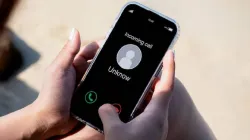No more unwanted loan, credit card calls; government working on new guidelines: Details here
The government has made preparations to crack down on fake calls related to banking, insurance, and loans that people receive throughout the day. New guidelines will soon be issued for the banking sector, including telecom companies.

The government is taking steps to curb banking fraud calls on mobile phones throughout the day. Guidelines related to this issue are expected to be issued soon. The Department of Telecommunications and TRAI have drafted guidelines for Prevention and Regulation of Unsolicited and Unwarranted Business Communication, 2024, which is set to be passed soon. The Consumer Affairs Department held a meeting recently to discuss this matter.
The meeting, chaired by Nidhi Khare from the Department of Consumer Affairs (DoCA), included representatives from the Department of Telecommunications (DoT), Telecom Regulatory Authority of India (TRAI), Cellular Operators Association (COAI), and all major telecom companies such as BSNL, Jio, Airtel, and Vi.
The draft guidelines take into account various aspects to ensure that no existing laws are disregarded. They outline what constitutes unwanted or inappropriate communication, and suggestions from committee members will be used to finalise the guidelines.
The draft guidelines on Prevention and Regulation of Unsolicited and Unwarranted Business Communication, 2024 have been prepared by subgroups of the committee established by DoCA in February this year. It is deemed important to address the issue of unwanted calls, and several meetings have been held to find a solution.
The guidelines also address the issue of fake calls and the importance of displaying caller ID. TRAI and DoT have advised telecom companies to activate caller names. Smartphone manufacturers have also been instructed to enable this feature.
Furthermore, principal entities such as banks, financial institutions, insurance companies, and trading companies have been urged to implement the Digital Consent Acquisition (DCA) system to give consumers a platform to provide digital consent.
Meanwhile, the Indian Computer Emergency Response Team (CERT-In), operating under the Ministry of Electronics and Information Technology, has issued a warning to users about potential vulnerabilities in Apple iTunes and Google Chrome for desktop. These vulnerabilities could allow attackers to execute arbitrary code on the targeted system. The affected software includes Apple iTunes versions prior to 12.13.2 for Windows. For Chrome for Desktop, the affected software includes versions prior to 124.0.6367.201/.202 (for Windows and Mac) and versions before 124.0.6367.201 (for Linux).
ALSO READ: How to recover deleted contacts from your smartphone? Essential Google settings you must know